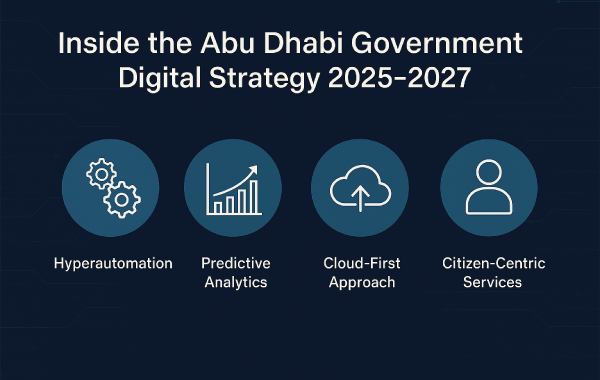“AI is going to be the new lifeblood, the new foundation for most governments—and for the private sector as well—and we need to have more focused government positions that are able to really look at the impact of the technology and are able to steer it.” Omar Sultan Al Olama, UAE Minister of State for Artificial Intelligence, Digital Economy, and Remote Work Applications
The Rise of Artificial Intelligence and the Global Race to Integrate It
Artificial Intelligence is no longer a futuristic concept—it’s the defining force of the 21st century, from predictive healthcare and autonomous vehicles to personalized finance and smart infrastructure. AI is rapidly reshaping how societies function. According to PwC, AI is expected to contribute $15.7 trillion to the global economy by 2030, with governments among the largest beneficiaries.
As AI advances at unprecedented speed, it’s no longer enough for nations to simply “adopt” the technology. The leaders of tomorrow will be those who embed AI at the core of their governance models—making services smarter, faster, and more anticipatory.
Abu Dhabi’s Bold Vision: AI-Native Governance by 2027
In a groundbreaking move, Abu Dhabi has announced its intention to become the world’s first fully AI-native government by 2027. This means that by the end of that year, all of the emirate’s digital government services will be designed, operated, and optimized using artificial intelligence.
This is not just a tech initiative—it’s a strategic shift in how public administration is envisioned. With this, Abu Dhabi positions itself not just as a regional leader in innovation, but as a global pioneer in next-generation governance.
“AI will be the biggest commercial opportunity in today’s fast changing economy.” PwC Global AI Study, 2017
A Strategy Rooted in Transformation
Launched under the Department of Government Enablement, the Abu Dhabi Government Digital Strategy 2025–2027 outlines a clear roadmap to an AI-native future. It’s built around four central pillars:
- Hyperautomation: Automating complex workflows using AI, IoT, and machine learning.
- Predictive Analytics: Anticipating citizen needs before they arise.
- Cloud-First Approach: Ensuring scalability and security with sovereign cloud systems.
- Citizen-Centric Services: Designing digital services around user experience, not bureaucracy.
To support this ambitious transition, Abu Dhabi has allocated over AED 13 billion (USD$ 3.5 billion) in infrastructure investment. This includes upgrades to digital platforms, training for government employees, and the development of new regulatory frameworks for responsible AI.
Innovation Through Partnerships
This transformation is being accelerated through strategic collaborations. Notably, Abu Dhabi has partnered with Microsoft and G42, a leading UAE-based AI company, to launch sovereign AI-powered cloud infrastructure—a first-of-its-kind for the region.
These partnerships bring deep technological expertise, ensuring that Abu Dhabi’s digital services are not just AI-enabled but AI-native at the foundational level.
“The Abu Dhabi Government Digital Strategy 2025-2027 reflects our leadership’s vision of being an AI-native government, seamlessly integrating AI across all government systems for a future that is proactive, agile and fully technology-enabled.” Ahmed Hisham Al Kuttab, Chairman of the Department of Government Enablement – Abu Dhabi
Projected Impact: Jobs, GDP, and Seamless Services
The scale of this transformation is massive. According to projections:
- AI-native services will contribute AED 24 billion to Abu Dhabi’s GDP by 2027.
- Over 5,000 new jobs will be created in the digital and AI sectors.
- Service delivery times are expected to drop by over 60%, with near-zero latency in citizen request handling.
From predictive traffic systems to AI-powered licensing, healthcare, and education services, Abu Dhabi aims to make digital interactions as seamless as possible—while maintaining transparency and trust.
Challenges Ahead: Ethics, Privacy, and Readiness
Despite the promise, a transition of this scale isn’t without challenges.
- Digital Equity: Ensuring all residents benefit equally from AI-enabled services.
- Data Privacy: Navigating the balance between personalization and protection.
- Algorithmic Bias: Building transparent and fair AI systems.
- Workforce Transformation: Reskilling public sector employees for an AI-first world.
The government has pledged to develop robust regulatory frameworks to govern data use and ensure AI ethics are embedded in every system.
A Blueprint for the Future of Governance
Abu Dhabi’s AI-native vision is not just about technology—it’s about redefining what good governance looks like in the digital age. If successful, it could serve as a blueprint for governments worldwide navigating the intersection of AI, public service, and societal well-being.
This is not a moonshot. It’s a calculated, well-funded strategy to put Abu Dhabi at the forefront of the AI governance revolution.
Citations
- PwC. (2017). Sizing the prize: What’s the real value of AI for your business and how can you capitalise?
- Department of Government Enablement. (2024). Abu Dhabi to be the world’s first fully AI-native government across all digital services by 2027.
- CIO. (2024). Abu Dhabi set to become the world’s first fully AI-powered government by 2027.
- The National News. (2025). Abu Dhabi reveals digital strategy 2025–2027 with $3.5bn for infrastructure.
- Microsoft + G42 partnership: CIO. (2024). Abu Dhabi pioneers AI-driven governance with Microsoft and G42 partnership.
- Department of Government Enablement’s official strategy briefings
- OECD. (2022). AI Principles & Guidelines.
- WEF Future of Jobs Report (2023)
